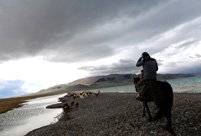 Not afraid of death
Not afraid of death
 Chen Guangbiao ads on A15 of NYT to host charity luncheon for 1,000 poor and destitute Americans
Chen Guangbiao ads on A15 of NYT to host charity luncheon for 1,000 poor and destitute Americans
 Passionate bar babies and fans feel the charm of World Cup 2014
Passionate bar babies and fans feel the charm of World Cup 2014
 US aircraft carrier docks in HK, welcomes PLA aboard
US aircraft carrier docks in HK, welcomes PLA aboard
 Graduation season: 'Take graduation photos to mark our love'
Graduation season: 'Take graduation photos to mark our love'
 College-student-turned nun becomes famous on Internet
College-student-turned nun becomes famous on Internet
 Japanese airplanes tail Chinese warplane in China's ADIZ
Japanese airplanes tail Chinese warplane in China's ADIZ
 China applies for UNESCO listing of Nanjing documents
China applies for UNESCO listing of Nanjing documents
 Picturesque scenery in Hongcun Village
Picturesque scenery in Hongcun Village
 Japan's PM vows to resume commercial whale hunt
Japan's PM vows to resume commercial whale hunt
TOKYO, June 23 -- Japanese Environment Minister Nobuteru Ishihara Monday apologized to officials in Fukushima Prefecture for remarks he had made earlier.
He had suggested that it was a matter of money as to whether the people and officials of the prefecture would agree to accept the government's plans to build storage units to contain massive amounts of radioactive soil accumulated, since the 2011 nuclear disaster there.
Ishihara apologized to the mayor of the town of Okuma, Toshitsuna Watanabe, for his remarks. Okuma is one of the potential sites for the storage facilities being eyed by the central government for the radioactive waste.
"I would like to deeply apologize for my remarks. I have caused you much trouble," local media quoted Ishihara as saying.
Watanabe told Ishihara that his comments had deeply hurt the local people of Okuma, but that his apology would be accepted as he came to the town personally to deliver the apology.
"It's a fact that our townspeople were not pleased by your remarks, but I will deeply accept your apology you have made in person, in which you have taken responsibility," Watanabe said.
The meetings were held at a temporary town hall set up in Aizuwakamatsu, Okuma and also attended by Parliamentary Vice Minister Tomoko Ukishima and another senior vice minister.
The embattled environment minister also met with Shiro Izawa, the mayor of Futaba, in Fukushima Prefecture, another candidate site for the controversial storage units, where he delivered a similar apology.
Ishihara also met with Fukushima Governor, Yuhei Sato, in Fukushima City, the capital of the prefecture later in the day.
Sato previously blasted Ishihara for his insensitive remarks, stating that they were "regrettable" and "trampled" on the Fukushima residents' longing for their hometowns, which was central to the March 2011 triple-meltdown of the Daiichi nuclear complex there, following a massive earthquake-triggered tsunami that led to the worst global nuclear crisis since Chernobyl in 1986.
Ishihara's gaffe involves comments he made to reporters on June 16 stating that the lengthy negotiations between the central and local government of Fukushima would ultimately be concluded by " the monetary value" of accepting the central government's proposal to build temporary storage tanks for the contaminated waste, as local municipalities earmarked to house them would stand to benefit financially.
Ishihara, son of author and former Tokyo governor Shintaro Ishihara -- himself no stranger to a slew of public gaffes -- tried to clarify his remarks and limit the damage by saying that he meant to say that only once the local authorities accept the proposal, can any compensation terms be discussed.
On Thursday, Ishihara officially retracted his remarks as pressure mounted from opposition parties for him to step down. The environment minister, while apologizing for his remarks, initially refused to retract them as he said they were made at an informal press briefing and not an official news conference.
"I retract my comments and apologize for causing misunderstanding as the remarks were not made in a dignified manner," Ishihara said during a parliamentary session Thursday, during which he was severely grilled by opposition party members as to the exact meaning of his remarks and the sentiments behind them.
Ishihara, in the session, however, indicated he had no intention of relinquishing his position and his retraction and reiteration of his apology were deemed insufficient by opposition parties, including the Democratic Party of Japan (DPJ), who jointly submitted a censure motion against Ishihara to the upper house of parliament Thursday.
The opposition parties also said they would submit a no- confidence motion against Ishihara to the lower house on Friday, with observers saying that his trip to Fukushima Monday to apologize in person, may have been made to dilute the hostilities being levied against him in parliament.
Since last December the central government and local Fukushima government have been at loggerheads over the construction of interim containment units for the contaminated soil, with the central government pushing to nationalize 16 square km of land around the crippled Daiichi nuclear facility, operated by Tokyo Electric Power Co., with an aim for them to be operational early next year.
Some local officials and residents in the areas earmarked to house the containment units have voiced concern that the facilities may not be temporary and want more assurances from the central government as to exactly when they will be relocated outside the prefecture.
 Stewardesses in Brazilian soccer jerseys
Stewardesses in Brazilian soccer jerseys Puzhehei: land of idyllic beauty
Puzhehei: land of idyllic beauty Chinese navy fleet visits Cape Town, South Africa
Chinese navy fleet visits Cape Town, South Africa PLA naval cadets toss their hats at graduation ceremony
PLA naval cadets toss their hats at graduation ceremony Graduation photo ideas: reliable alumnus and happy alumna
Graduation photo ideas: reliable alumnus and happy alumna Super daddies in 2014 World Cup
Super daddies in 2014 World Cup College girls take stylish photos to help enrollment
College girls take stylish photos to help enrollment Rebuilding the silk road
Rebuilding the silk road Top 10 Chinese products scoring World Cup goal
Top 10 Chinese products scoring World Cup goal In Pictures: Female fans of World Cup
In Pictures: Female fans of World Cup China's top 10 representative architectures
China's top 10 representative architectures Photo story: A day of 'mini girl'
Photo story: A day of 'mini girl' Top 20 hottest women in the world in 2014
Top 20 hottest women in the world in 2014  Cute animals' leisure summer in zoo
Cute animals' leisure summer in zoo Exhibition of the Buddha held in Tibet
Exhibition of the Buddha held in TibetDay|Week|Month